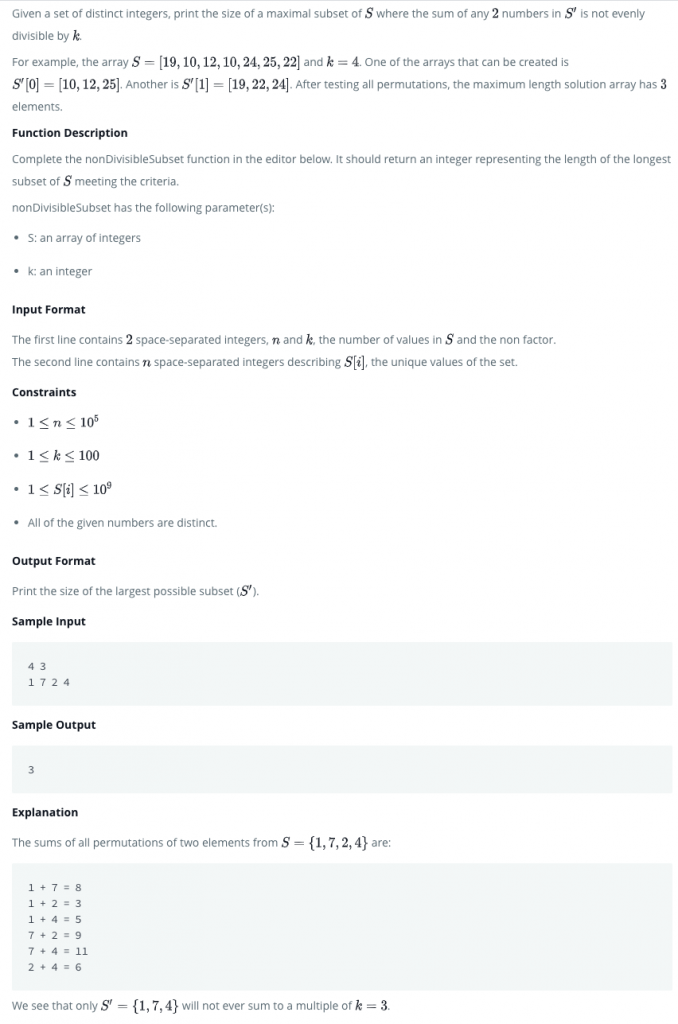Description

Submission
A Stupid Submission
- Follow the explanation
- Greedy Algorithm, not always work, made the problem really complicated
#include <iostream>
#include <vector>
#include <map>
#include <experimental/map>
using namespace std;
/*
* Complete the 'nonDivisibleSubset' function below.
*
* The function is expected to return an INTEGER.
* The function accepts following parameters:
* 1. INTEGER k
* 2. INTEGER_ARRAY s
*/
int nonDivisibleSubset(int k, vector<int> s) {
vector<pair<int, int>> v; // pairs that divide
map<int, int> m; // count for each single number
for(int i = 0; i < s.size(); ++i) {
for(int j = i + 1; j < s.size(); ++j) {
if((s[i] + s[j]) % k == 0) {
v.push_back(pair<int, int>(s[i], s[j]));
if(m.find(s[i]) != m.end()) m[s[i]]++;
else m.insert(pair<int, int>(s[i], 1));
if(m.find(s[j]) != m.end()) m[s[j]]++;
else m.insert(pair<int, int>(s[j], 1));
}
}
}
while(!v.empty()) {
map<int, int>::iterator max = m.begin();
for(map<int, int>::iterator it = m.begin(); it != m.end(); advance(it, 1)) {
if(it->second > max->second) max = it;
}
// remove max->first from related pairs
for(auto it = v.begin(); it != v.end();) {
if(it->first == max->first || it->second == max->first) it = v.erase(it);
else ++it;
}
// remove max->first from map entries
for(auto it = m.begin(); it != m.end(); ) {
if(it->first == max->first) it = m.erase(it);
else ++it;
}
// remove max->first from s
for(auto it = s.begin(); it != s.end(); ) {
if(*it == max->first) it = s.erase(it);
else ++it;
}
}
return s.size();
}
int main()
{
int n; cin >> n;
int k; cin >> k;
vector<int> s(n);
for (int i = 0; i < n; i++) {
cin >> s[i];
}
int result = nonDivisibleSubset(k, s);
cout << result << "\n";
return 0;
}
Smart Submission
- Categorize the numbers based on their remainder against k
- i and k-i are complementary, only one of these should survive, we should remove the one with fewer numbers in it
- When the remainder is 0, only 0 or 1 number in this category could survive
- When k is even and the remainder is k/2, only 0 or 1 number in this category could survive
#include <iostream>
#include <vector>
#include <map>
#include <experimental/map>
using namespace std;
/*
* Complete the 'nonDivisibleSubset' function below.
*
* The function is expected to return an INTEGER.
* The function accepts following parameters:
* 1. INTEGER k
* 2. INTEGER_ARRAY s
*/
int nonDivisibleSubset(int k, vector<int> s) {
vector<int> count(k);
for(int i = 0; i < count.size(); i++) {
count[i] = 0;
}
for(auto e : s) {
count[e % k]++;
}
int r = 0;
for(int i = 1; i <= (k - 1) / 2; i++) {
if(count[i] == 0 || count[k-i] == 0) continue;
int min = count[i] < count[k-i] ? count[i] : count[k-i];
r += min;
}
if(k % 2 == 0) {
r += (count[k/2] ? count[k/2] - 1 : 0);
}
return count[0] ? s.size() - r - count[0] + 1 : s.size() - r;
}
int main()
{
int n; cin >> n;
int k; cin >> k;
vector<int> s(n);
for (int i = 0; i < n; i++) {
cin >> s[i];
}
int result = nonDivisibleSubset(k, s);
cout << result << "\n";
return 0;
}
